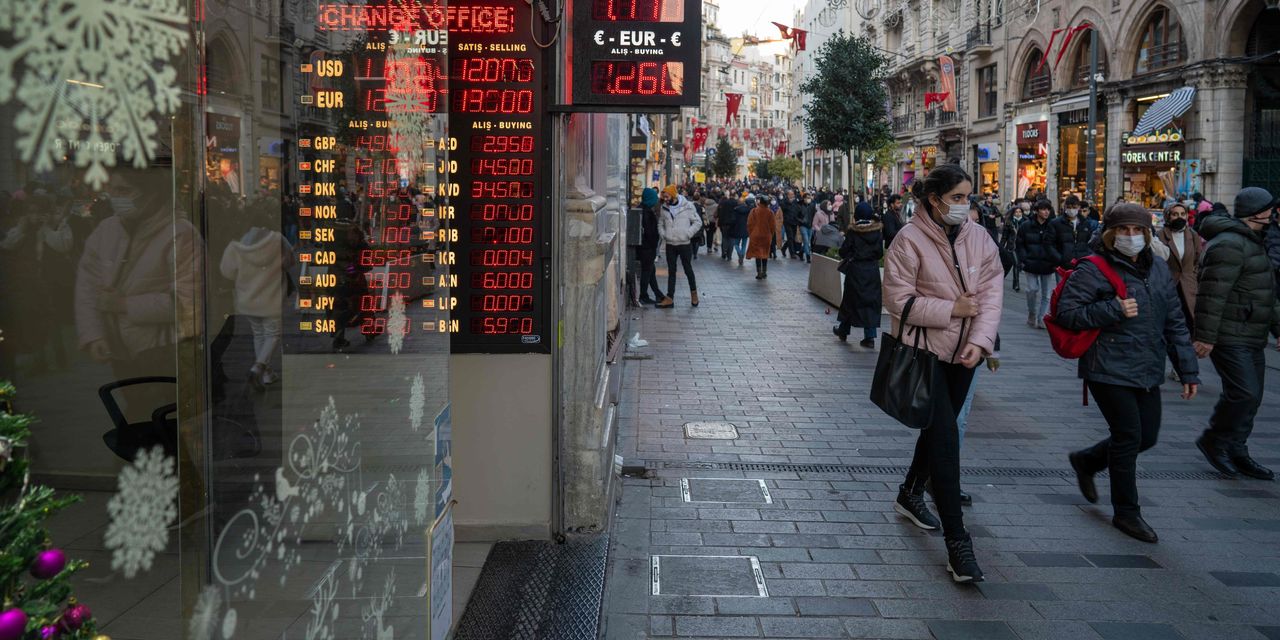
Turkey’s currency tumbled against the dollar Wednesday, a setback to the government’s experimental plan to stabilize the currency.
The lira fell more than 6% against the greenback, undoing part of the currency’s significant comeback since last week, when Turkey’s government said it would guarantee returns on certain lira bank deposit accounts at a rate similar to those on foreign currency. The plan was aimed at stopping a brutal currency meltdown.
The currency remains down more than 40% against the dollar this year, with 12.6 lira buying $1, though that is far stronger than it was before the plan was announced.
Analysts pointed to a changing understanding of what prompted the currency’s surge last week. Some initially thought the program, which encourages savers to keep money locked up in Turkish lira, caused a surge of deposits. President Recep Tayyip Erdogan said that lira deposits increased by 23.8 billion lira, equivalent to about $2 billion, after the announcement.
Yet in the days surrounding that announcement, economists say the government also may have intervened heavily in foreign-exchange markets, snapping up lira in an effort to counter the currency’s downward spiral. Intervention cost the central bank at least $5.5 billion in foreign-exchange assets in the days around the unveiling of the deposit plan, according to official data. Economists say they haven’t seen a rise in lira deposits in official data.
“The narrative on what drove the rapid appreciation last week has changed now toward foreign-currency intervention rather than increased lira deposits,” said Erik Meyersson, a senior economist at Swedish bank Handelsbanken.
Confidence in Turkey’s currency diminished this fall following a series of central-bank interest-rate cuts championed by Mr. Erdogan that fly in the face of economic orthodoxy, which calls for higher borrowing costs to stamp out price rises. Spiraling inflation has reduced the lira’s buying power.
Official annual inflation data for November surpassed 20%, and economists expect it could hit 30% in December. Figures are expected to be released on Jan. 3.
Turkey’s central bank said in a report published Wednesday that it would target 5% inflation and allow the exchange rate to be determined by supply-and-demand factors. Investors and economists say they have lost confidence in the central bank’s ability to meet those goals, due to political pressure and a perceived lack of independence.
High inflation will be the core barrier to getting Turks to hold the lira. Turks have sought to store savings in dollars, euros and gold instead of the lira, a trend that economists don’t anticipate reversing from the new deposit policy.
“Today we’re seeing the lira depreciate again, and I don’t see any real arguments to why the lira should stabilize,” Mr. Meyersson said.
The lira’s slide comes days after the government ratcheted up a yearslong crackdown on dissent about the economy in public discourse. Turkey’s banking regulator said in a Twitter post on Monday that it was bringing criminal complaints against former central-bank officials, economists and journalists for making online posts that the regulator alleged manipulated currency movements.
Former central bank governor Durmus Yilmaz, named on the list, said he learned about the complaint on social media. He has yet to receive a formal notification and doesn’t know specifics of why the regulator made a criminal complaint against him.
Rusdu Saracoglu, another former central-bank governor named, expressed confusion, writing on Twitter, “I left the central bank in 1993. I am retired since 1999. I don’t know how I would influence the markets.”
Write to Caitlin Ostroff at [email protected]
Copyright ©2021 Dow Jones & Company, Inc. All Rights Reserved. 87990cbe856818d5eddac44c7b1cdeb8








